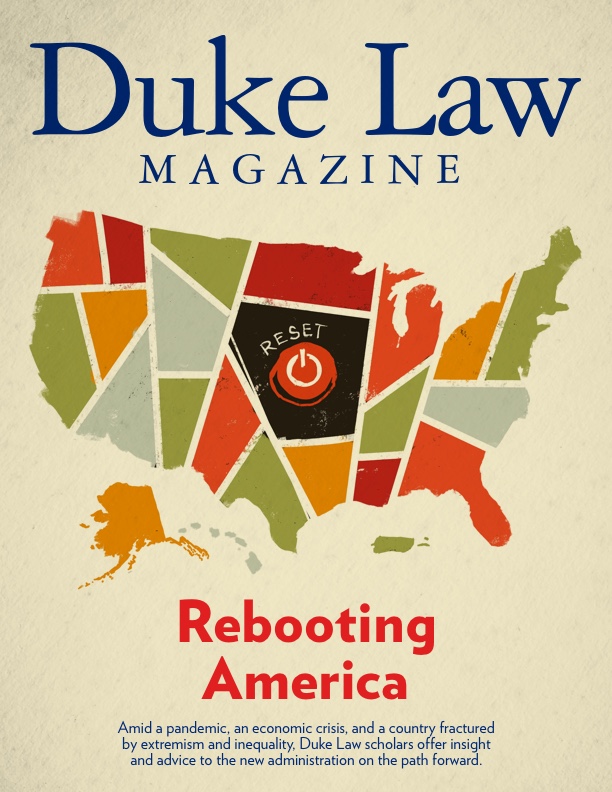
Foreign relations and international law | Curtis Bradley
Rebuild trust with traditional allies and look for allies in Congress

A key focus of President Biden’s initial foreign policy agenda involves, as it should, undoing the damage that he believes the Trump administration has done to U.S. foreign affairs, including by rebuilding trust and relationships with traditional allies.
Biden will be much more multilateral — he’s already made that clear — than President Trump. Trump’s “America First” approach often ended up being America by itself. Biden will, as he said, work to try to form partnerships and coalitions with other countries to promote U.S. interests in foreign policy. That includes working through international organizations, which Trump was not very interested in doing.
Biden wasted no time in signaling a new approach: On his first day in office, he took action to have the United States rejoin the Paris Agreement on Climate Change, and he halted U.S. withdrawal from the World Health Organization.
Biden will quite properly recommit the United States to NATO, which Trump sometimes critiqued or even threatened to withdraw from. Even Republicans in Congress have raised concerns about Trump’s positions on that front. In general, I think Biden will try to work through international organizations and strengthen them on the theory that the U.S. can accomplish a lot more working with other partners than trying to do it by itself.
A trickier issue, and one on which Biden has not been as clear about his intentions, is the Iran nuclear deal. Trump pulled the U.S. out of the deal, which also included a number of other nations. Biden has indicated his interest in trying to at least negotiate a new agreement with Iran, something that might be controversial in Congress. But President Obama was able to make that agreement without congressional approval, and I think it’s possible that Biden will end up doing the same thing by treating it as a non-binding “soft law commitment” rather than a binding treaty. It therefore would not require either congressional or the Senate approval.
Biden wasted no time in signaling a new multilateral approach: On his first day in office, he took action to have the United States rejoin the Paris Agreement on Climate Change, and he halted U.S. withdrawal from the World Health Organization.
Another early action I would expect to see is for Biden to stop the sanctions that Trump imposed on officials from the International Criminal Court. That court has started an investigation of U.S. actions in Afghanistan, and, in protest, the Trump administration imposed sanctions against the prosecutor and some other officials. That was done by executive order, so it can be withdrawn by Biden, and he has indicated that he is likely to do so. I also think he’ll try to work more cooperatively with the International Criminal Court on issues where it’s in the U.S. interest to do so.
Other steps Biden is likely to take are more matters of policy orientation. For example, I think Biden is going to restore human rights as a more central element of U.S. foreign policy than it was under Trump and, as a result, there will be more criticisms coming out of the U.S. State Department and other parts of the government about problems in human rights abroad. He can do that under existing law.
In terms of geopolitical issues, I think there will be some overlap in a couple of areas between Biden and Trump. My guess, for example, is that Biden will still have a pretty adversarial relationship with China, particularly around economic and trade issues. Biden cares a lot about fair trade and he overlaps a bit with Trump’s concerns on that. But I think Biden will seek more cooperation with other governments when combating China’s activities or positions.
We’ll probably see a more adversarial relationship with Russia than we saw under Trump, who was very muted in his criticisms of Russia. Having said that, I think Biden is interested in seeing if there is room to work out new deals with Russia on matters such as arms control, and in fact he has already announced plans to seek a five-year extension on the New Strategic Arms Reduction Treaty.
We might see a new approach to North Korea. I’m not sure any of the approaches of past administrations worked all that well. Trump was willing to meet with Kim Jong-un, which was a very big deal. But it never seemed to produce anything positive on the U.S. side of the equation and, if anything, it looks like North Korea primarily just had more time to work on its weapons production and nuclear capability. My guess is that Biden will return to the past model of handling North Korea, which is working with Japan, South Korea, and other countries to keep the pressure on North Korea to denuclearize and will continue sanctions against North Korea, but also look for opportunities for possible negotiation. I don’t think he’ll close the door on negotiations, but it will probably not involve an effort at forging a personal relationship with Kim Jong-un.
Getting important new foreign affairs legislation through Congress might be difficult, even with Democratic control, and getting controversial treaties through, which takes two thirds of the Senate, will be particularly difficult. So my guess is that, although Biden will look for opportunities to work with Congress and will seek bipartisan cooperation where possible, he will not hesitate to act unilaterally. This may involve, for example making non-binding commitments with other countries, which don’t require the consent of the Congress or the Senate, and which can be implemented through administrative regulations, executive orders, or foreign policy announcements and diplomacy. In any event, one way or another, most of the things that I’ve mentioned can be done by Biden pretty much leading the way.

